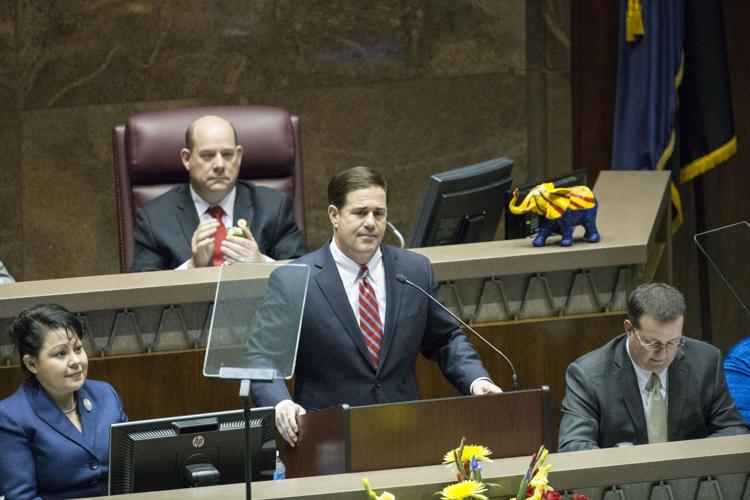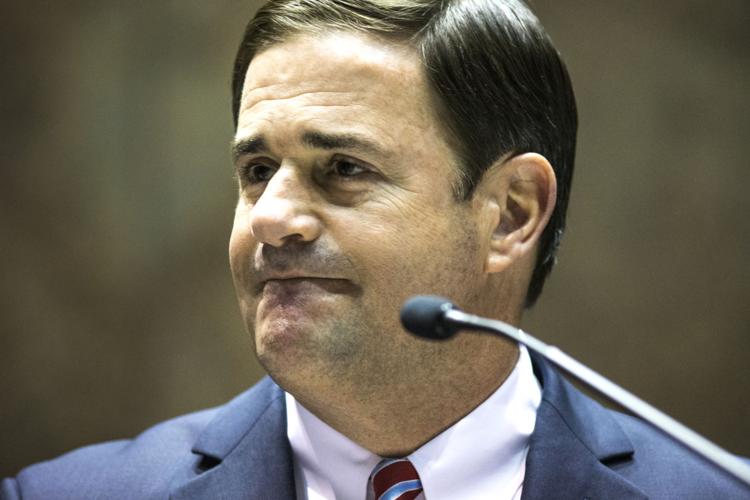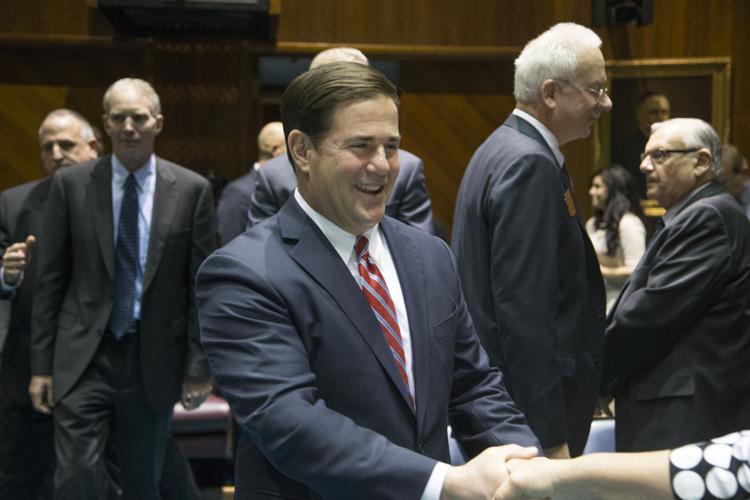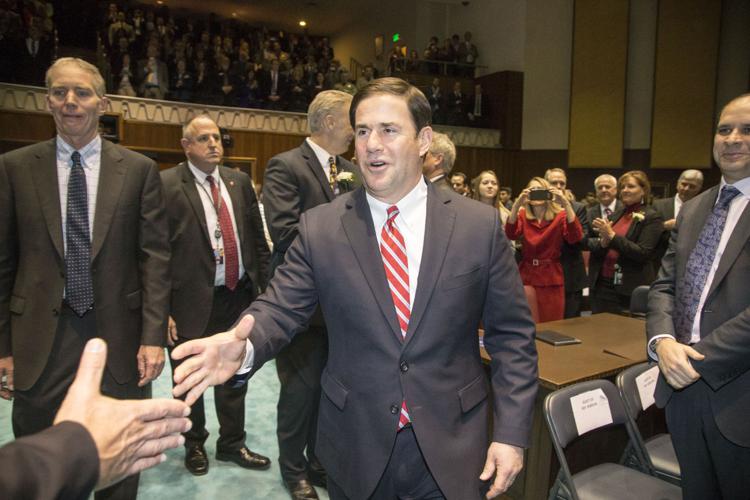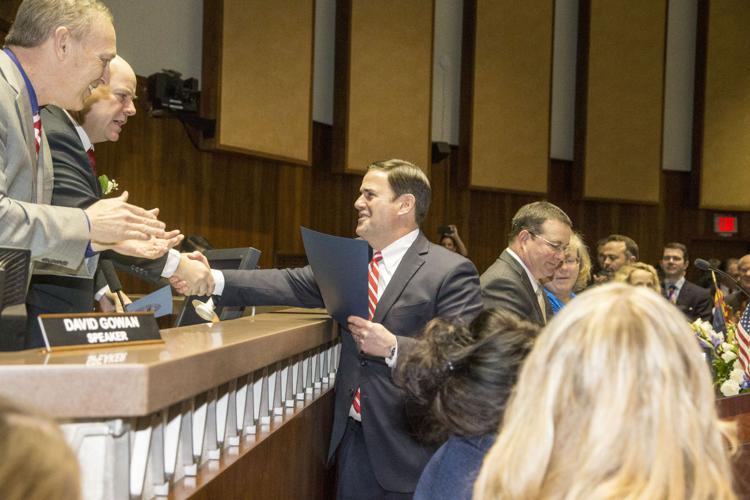PHOENIX — Gov. Doug Ducey promised Monday to cut taxes, eliminate some government regulations, help keep inmates from going back to prison and investigate new long-term sources of water for Arizona.
In his second State of the State speech, the governor promised to be a “partner” in strengthening higher education after approving a budget last year that cut $99 million from the state’s three universities. Ducey, however, provided no specifics.
Eileen Klein, president of the Arizona Board of Regents, said she was pleased the governor recognizes the importance of the university system. But she expressed a bit of concern that the governor provided no specifics and even said in his speech he wants to be cautious in new spending.
“I appreciate the caution,” Klein said. “But at this point, the (state) revenue gains are undeniable,” she said.
The state ended last year with an extra $325 million in the bank, with tax collections so far this fiscal year running $200 million above projections.
“We need to be sure the universities get their fair share of the revenue increases,” Klein said.
The governor’s proposals on K-12 also lacked specifics.
Ducey agreed to put money — he did not say how much — into a long-ignored fund to help public schools pay for badly needed repairs.
Separately, Ducey wants to use $24 million that lawmakers set aside to help both traditional public schools as well as charter schools finance new construction. House Minority Leader Eric Meyer questioned the wisdom of that.
“I’ve said all along we should spend the money on some district schools now rather than have some complicated plan that may finance businesses to open schools,” Meyer said.
Technically speaking, charter schools are public schools. They get a set amount of state aid per student and are exempt from certain other regulations that govern traditional schools.
But Meyer said that’s no excuse to make what might be legally questionable loans to charters.
“When charter schools opened, they were supposed to be efficient and effective and be able to operate without those monies,” he said. “What’s changed about that?”
There’s another factor at work: In Arizona, charters can be operated as for-profit corporations, with any buildings constructed ultimately the property of the private companies that run the schools.
And the Arizona Constitution specifically bars the state from giving or loaning its credit “to any individual, association or corporation.”
But gubernatorial press aide Daniel Scarpinato said Ducey believes the plan he has, to be unveiled Friday, passes constitutional muster.
Against unnecessary state regulations
Issues of state revenues and spending aside, the governor took specific aim at what he said are unnecessary state regulations. But Ducey wants to go further, scrapping some state oversight entirely.
“Arizona requires licenses for too many jobs, resulting in a maze of bureaucracy for small-business people looking to earn an honest living,” he said. And the governor said he did not need to look far for examples.
“Believe it or not, the state of Arizona actually licenses talent agents,” he said. “Let’s leave the job of finding new talent to (“The Voice” hosts) Adam Levine and Gwen Stefani, not state government.”
Meyer said he shares the governor’s view that some regulation may be unnecessary.
“I didn’t know that we regulated talent agents until today,” he conceded.
Rejects ‘living wage’ laws
Ducey separately fired a salvo at Flagstaff and other Arizona cities that are considering adopting their own “living wage” requirements, threatening to punish those cities if they go ahead. He called them “trendy, feel-good policies that are stifling opportunity across the nation.
“I will use every constitutional power of the executive branch and leverage every legislative relationship to protect small businesses and the working men and women they employ,” Ducey threatened. He said that would even include cutting state-share revenues for communities that adopt a minimum wage higher than Arizona law mandates.
That measure could take the form of a voter-approved initiative. But Scarpinato said that does not mean his boss knows what’s better for Flagstaff than the people who live there.
“We’re talking about having an approach statewide, where we’re pro-jobs, not anti-jobs,” he said. Scarpinato said that means being able to employ more people, not less.
Ducey said all this is to differentiate Arizona from California.
“The goal is simple: to grow our economy, to take full advantage of our geography to better address the needs of businesses fleeing California and other states on the decline,” he said.
Lauds Pima County parole program
Ducey also gave a specific shout-out to a special program run by the Department of Corrections in Pima County that handles people who have violated conditions of their parole. Often, the governor said, these are technical violations, like failing a drug test or neglecting to check in.
This program allows parolees to have counseling — sometimes while in custody — rather than simply being sent back to prison. The result, according to the governor’s staff, has been that two-thirds of those in the Pima program complete it and don’t go back behind bars where they add to the state’s prison overcrowding situation.
He wants to extend that to Maricopa County, where about two-thirds of the inmates are being released.
“Let’s give them a second chance so they stay clean and never end up back in prison,” said Ducey.
Other provisions in Ducey’s 42-minute speech include:
- Forming a special panel to look at ways of expanding opportunities in what he calls the “sharing” economy. That includes not only rideshare services like Lyft and Uber, but also online operations like Airbnb, which allows homeowners and renters to make space available to visitors.
- Provide funds to deal with the backlog of uninspected “rape kits,” with 2,300 in Maricopa County alone, a backlog he said allows “predators (to) evade the law looking for their next victim.”
- Add what he admitted is badly needed experts to the Department of Water Resources to help determine the state’s water supply.
- Revamp the quasi-private Arizona Commerce Authority to focus more on marketing and promotion.


